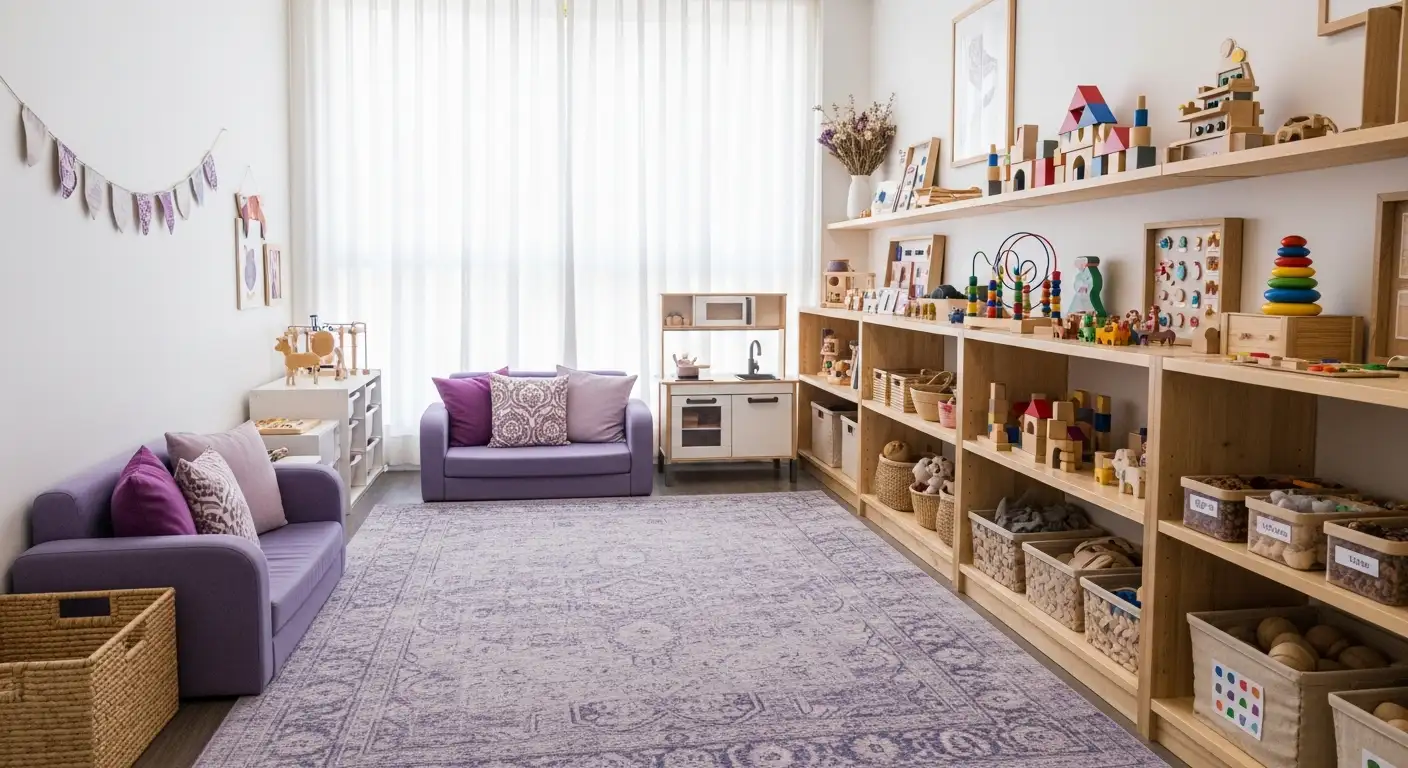Understanding the Landscape of Autism Support in Colleges
As the number of students on the autism spectrum entering higher education rises, colleges across the country have developed specialized programs to support their unique needs. These programs offer comprehensive resources catering to academic, social, and life skills, ensuring that autistic students thrive both on campus and beyond. This article explores the variety of college programs available, the role of Applied Behavior Analysis (ABA) therapy in autism support, and how institutions nationwide are breaking down barriers for neurodiverse students.
Applied Behavior Analysis (ABA) Therapy: Foundations and Role in Autism Support
What is Applied Behavior Analysis (ABA) therapy and how is it used for autism treatment?
Applied Behavior Analysis (ABA) therapy is a scientifically validated approach rooted in the principles of learning and behavior. It specifically targets individuals with autism to help them acquire new, functional skills and reduce behaviors that might impede their daily functioning.
ABA programs are highly personalized, meaning interventions are tailored to the unique needs of each individual. This customized treatment focuses on key areas such as communication, social interaction, academic achievement, and everyday living skills. Techniques commonly used in ABA include positive reinforcement—rewarding desired behaviors to encourage repetition—discrete trial training, which breaks complex skills into manageable steps, and naturalistic teaching that integrates learning in everyday settings.
This therapy is not limited to one environment; it can be applied effectively in homes, schools, clinics, and community settings. Ongoing data collection and regular assessment ensure that the strategy remains effective and is adjusted as the individual progresses.
The primary goal of ABA is to foster independence and enhance participation in social and academic activities. By methodically teaching skills and promoting the generalization of learning across different situations, ABA helps individuals with autism navigate a broader range of life experiences successfully.
Recognized as a best practice by authoritative medical and psychological associations, ABA therapy remains a cornerstone in autism treatment, providing a structured yet flexible framework to support lifelong development and well-being.
Qualified Providers of ABA Therapy and Their Role in College Programs
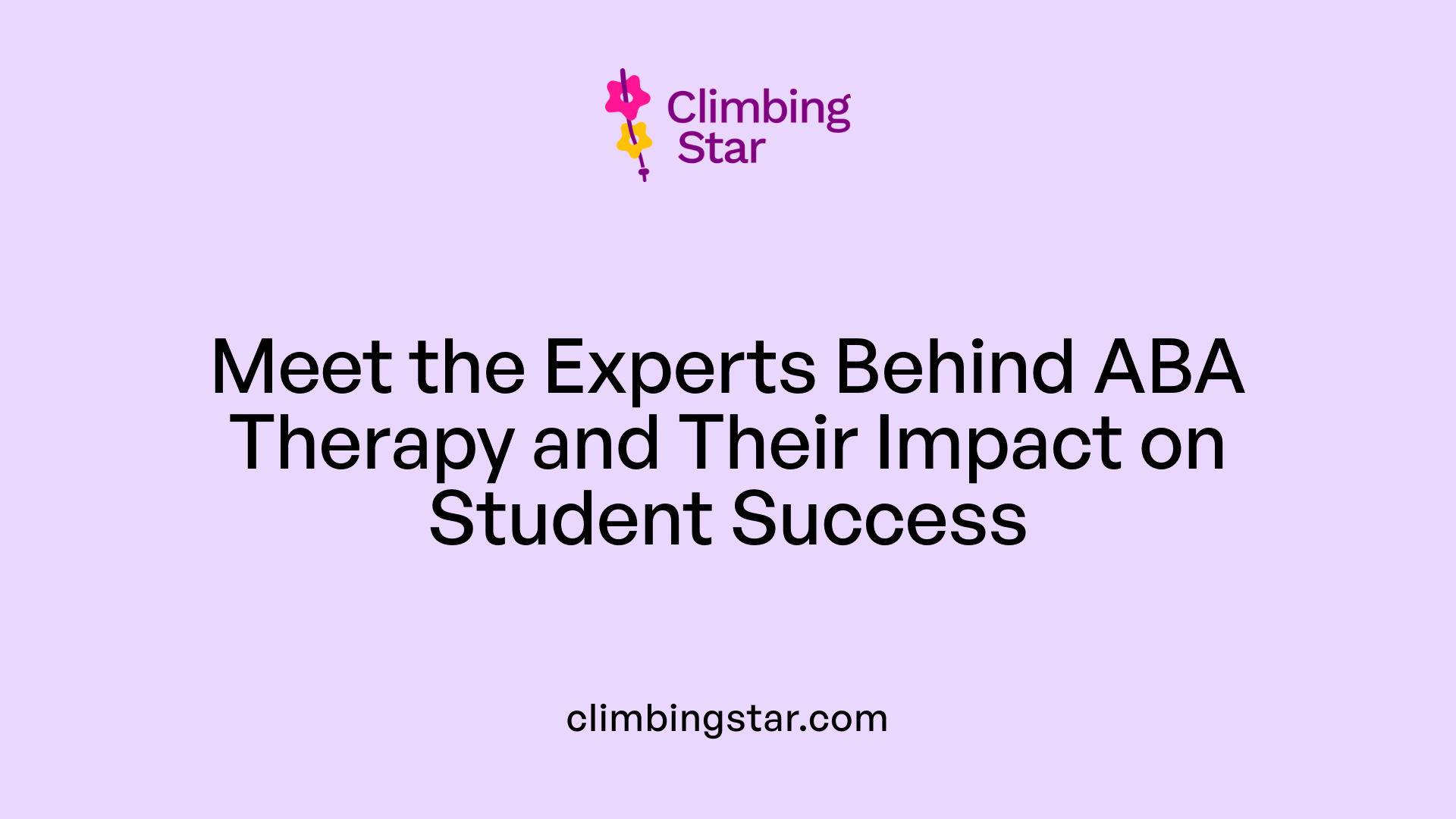
Who provides ABA therapy and what qualifications do these professionals have?
Applied Behavior Analysis (ABA) therapy is delivered by skilled professionals including Board Certified Behavior Analysts (BCBAs) and trained therapists or behavior technicians.
B Specialists, the BCBAs, have extensive education and certification in behavior analysis. They design individualized treatment plans tailored to meet the unique needs of autistic students, particularly within college programs supporting independent living, social skills, and academic success. These professionals also supervise therapy sessions to maintain high standards and ethical practices.
Therapists or behavior technicians work closely under BCBA supervision to carry out the prescribed interventions. Their role often involves implementing strategies such as reinforcement, shaping, and chaining to encourage positive behaviors and skill acquisition.
What supervisory and ethical frameworks guide professionals delivering ABA?
ABA providers follow stringent guidelines for training, supervision, and ethical service delivery to ensure treatments are effective and respect the dignity of individuals. Supervision by BCBAs includes regular observation, data analysis, and adjustments to therapy as needed.
How important is parent involvement and ongoing assessment?
A collaborative approach involving parents or guardians is pivotal, integrating their insights and feedback. Continuous data collection helps assess progress and adapt interventions to foster success in areas crucial for college students, such as self-advocacy and daily living skills.
Thus, qualified ABA therapy providers, through their expertise, supervision, and engagement with families, play an essential role in helping students with autism thrive in post-secondary education environments.
Behavioral Issues and ABA: Strategies Used in College Autism Support Programs
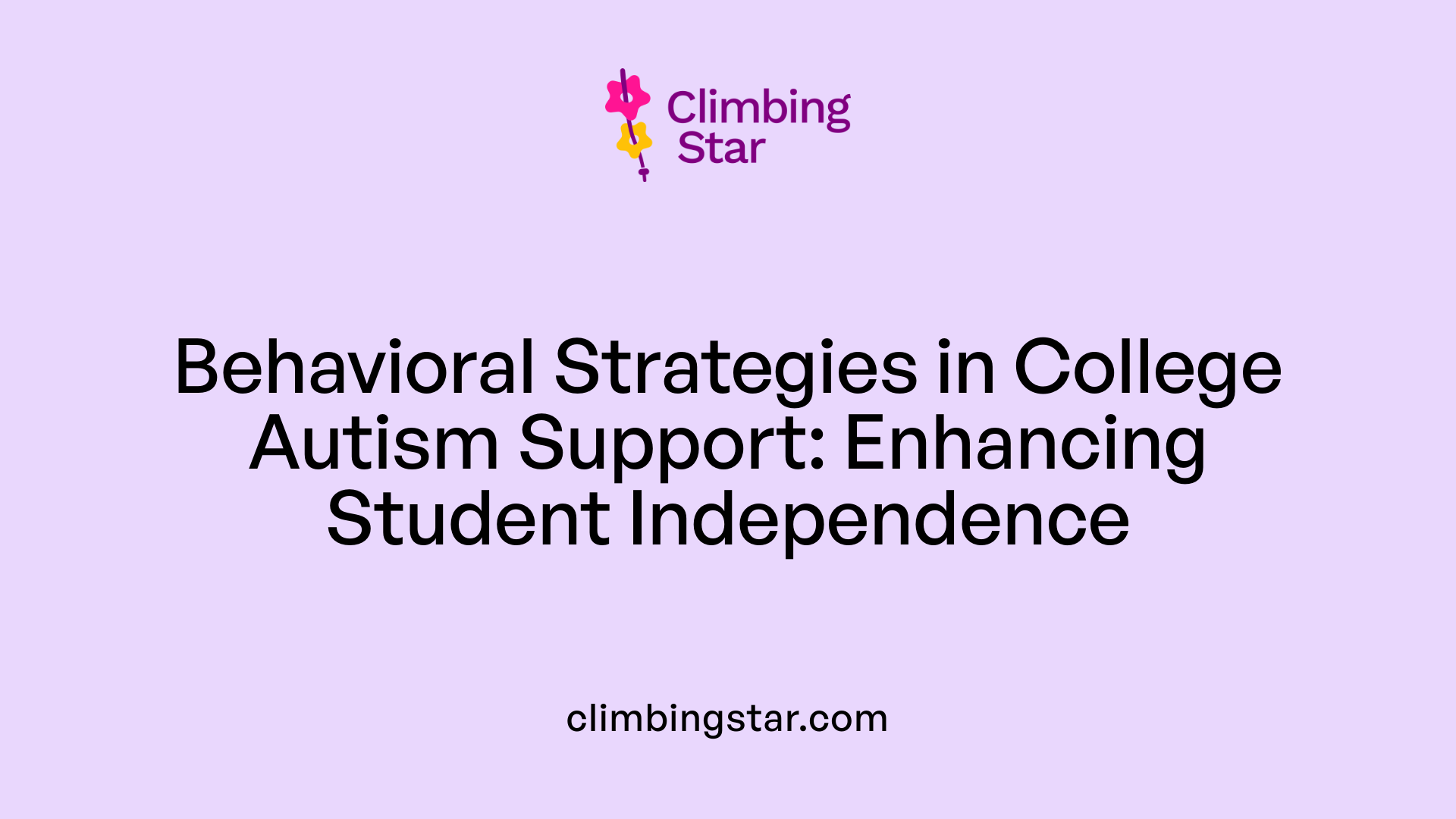
How do ABA therapy programs address behavioral issues in individuals with autism?
Applied Behavior Analysis (ABA) therapy is essential in college autism support programs for managing behavioral challenges. It uses a scientific approach to understand and modify behaviors by assessing each individual's needs and collecting data continuously.
Students work with therapists to set personalized, measurable goals aimed at improving communication, social interaction, and everyday living skills. Positive reinforcement is a cornerstone technique used to encourage desirable behaviors while reducing disruptive or harmful actions.
Key methods often used include Discrete Trial Training (DTT), which breaks down complex skills into manageable steps for easier learning, and Picture Exchange Communication Systems (PECS), which assist nonverbal students in communication.
ABA services are adaptable, seamlessly delivered in various settings such as classrooms, residences, or community environments, ensuring they fit the student's lifestyle and preferences.
Continuous monitoring through data collection allows programs to adjust strategies in real-time, maximizing student progress and success within the college environment.
Proven Effectiveness of ABA Therapy for Students with Autism
What evidence supports the effectiveness of ABA therapy for individuals with autism?
Research provides substantial evidence that Applied Behavior Analysis (ABA) therapy effectively improves social, communication, and adaptive behaviors in children with autism spectrum disorder (ASD).
Numerous studies, including randomized controlled trials and meta-analyses, show significant gains in social skills, language development, daily living capabilities, and emotional regulation for children receiving ABA interventions. This evidence supports ABA as an evidence-based best practice for autism treatment.
What are some successful ABA interventions?
Some ABA approaches that have demonstrated success include:
- Early Start Denver Model (ESDM): Combines developmental and ABA principles to boost verbal skills and reduce problem behaviors in young children.
- Picture Exchange Communication System (PECS): Uses pictures to improve communication abilities.
- Discrete Trial Training (DTT): Breaks down skills into small, teachable components with repetition and reinforcement.
- Pivotal Response Training (PRT): Focuses on pivotal areas such as motivation and response to multiple cues to produce widespread improvements.
Why is early and intensive therapy important?
The timing and intensity of ABA therapy are critical. Early intervention maximizes developmental gains during crucial learning periods. Intensive programs, typically involving 20-40 hours per week, have been shown to lead to better outcomes in verbal skills, social interactions, and decrease in challenging behaviors.
How is ABA therapy recognized?
ABA is widely recognized by medical and educational authorities as one of the most evidence-based treatments for autism spectrum disorders. It is endorsed by organizations such as the American Psychological Association and the U.S. Surgeon General. This recognition is based on the substantial scientific support for its methods and consistent positive results across diverse populations and settings.
A Nationwide Overview of College Programs Supporting Autistic Students
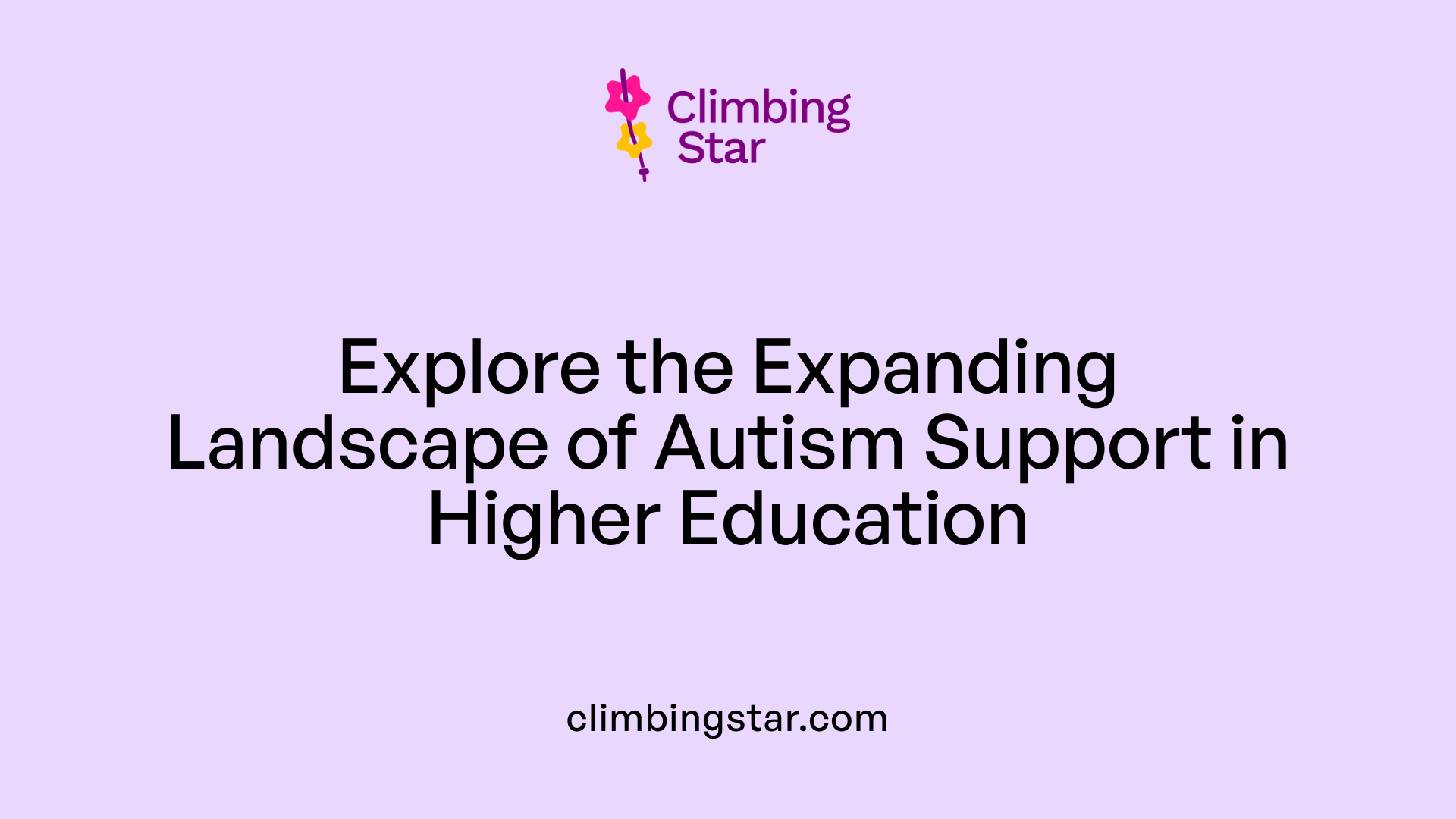
How widespread are autism support programs in U.S. colleges?
Autism support services at colleges span the entire United States, reflecting a national commitment to inclusivity. Institutions from Alabama to Wyoming offer specialized programs geared toward the unique needs of autistic students.
Which states provide these programs?
Colleges with autism support programs are located in over 40 states, including:
- Alabama
- California
- Delaware
- Florida
- Illinois
- Michigan
- New Jersey
- Texas
- Washington
- Wisconsin This wide distribution ensures access to resources for students across diverse regions.
What types of support services do these programs provide?
Services vary by program but commonly include:
- Peer mentoring and social skills training
- Academic support and executive function coaching
- Independent living skills and career preparation
- Mental health counseling
- Transition and self-advocacy coaching
- Residential accommodations Many programs combine several supports for comprehensive assistance.
What are some examples of notable university programs?
| University | Program Name | Services Provided |
|---|---|---|
| Drexel University | Autism Support Program | Peer mentoring, seminars, campus integration |
| Eastern Michigan University | College Supports Program | Social/emotional coaching, life skills, family involvement |
| University of Alabama | ASD College Transition | Self-advocacy, daily living, peer mentoring |
| Syracuse University | OnTrack | Weekly academic & executive function coaching |
| Western Kentucky University | Kelly Autism Program (KAP) | Residential support, mentoring, mental health, social activities |
| Beacon College | N/A | Accredited college focused on neurodiverse students |
| Adelphi University | Bridges to Adelphi | Social, academic, vocational support, mentorship |
How accessible are these programs and what about costs?
Accessibility ranges from free, grant-funded programs to fee-based options with costs like:
- University of Alabama: ~$3,000 per semester
- Rutgers University: ~$7,000 per year
- Nova Southeastern University: ~$8,000 per semester Many universities also provide free counseling and peer mentoring to supplement paid services. This spectrum of availability helps accommodate different financial situations.
Together, the extensive nationwide offerings and diverse services demonstrate a growing commitment to supporting autistic students' success in higher education.
Academic and Social Support Services Offered in College Autism Programs
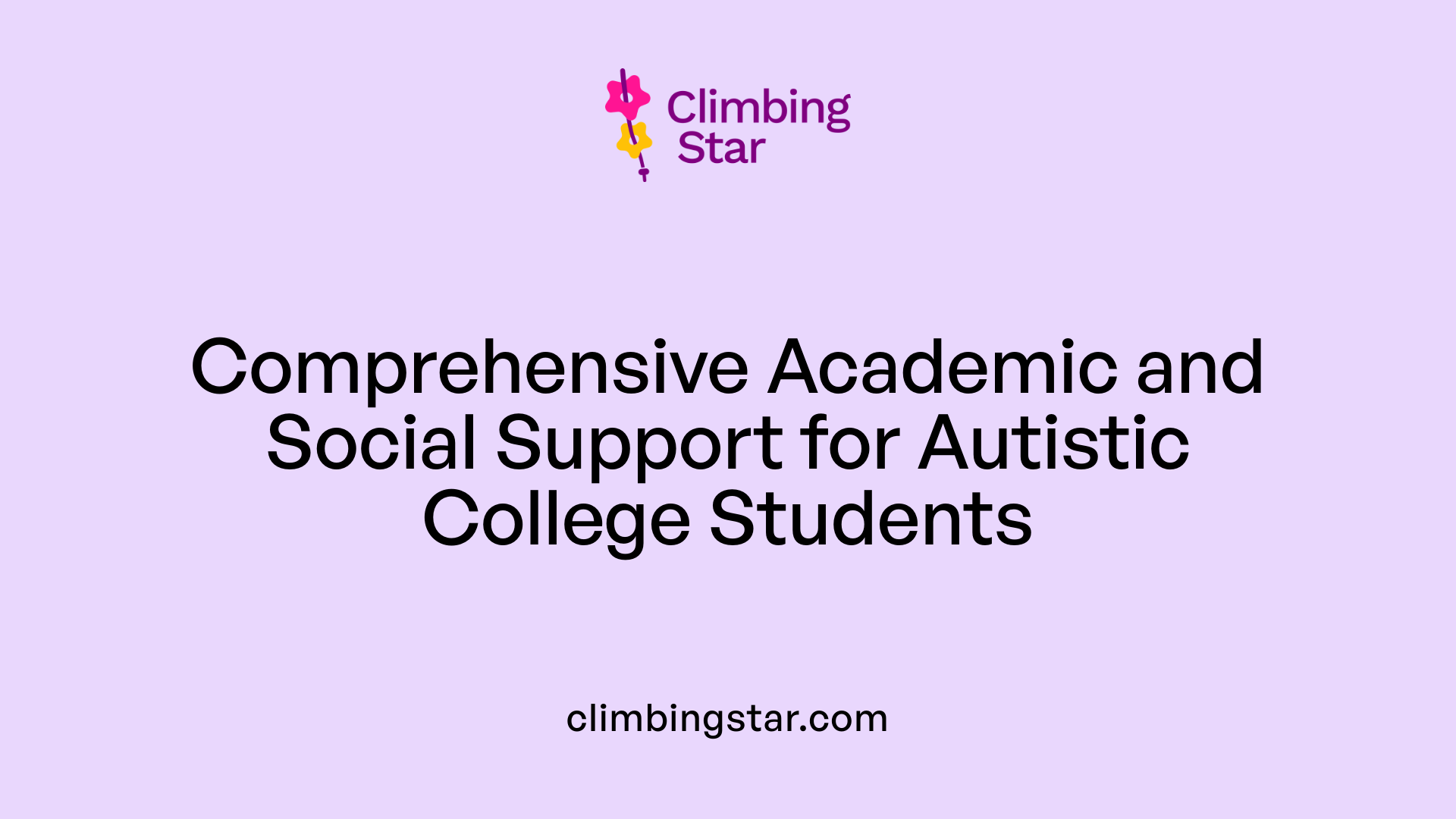
Academic assistance and tutoring
Many college programs designed for students with autism offer robust academic support services. These include individualized tutoring sessions, help with course registration, note-taking assistance, and strategies to enhance study skills. Programs such as Rutgers University's College Support Program provide academic coaching tailored to each student's needs, while flagship offerings at schools like Drexel University include seminars that promote understanding and successful navigation of college coursework.
Social skills training and peer mentoring
Social integration is a major focus for autism support programs at the college level. Initiatives like Adelphi University's Bridges to Adelphi program and the Autism Collaborative Center at Eastern Michigan University include social skills workshops, peer mentoring, and group discussions. These efforts aim to develop communication skills, provide socialization opportunities, and create supportive community networks among students.
Executive function and life skills coaching
Executive function training and life skills development are foundational in many autism programs. For example, University of Maryland's SIGNA program incorporates coaching on executive functioning, self-advocacy, and social communication. Similarly, Missouri's Kelly Autism Program and Thomas More University emphasize independence through strategies like daily living skills coaching, organizational support, and use of assistive technology.
Vocational and career preparation
Supporting career readiness is another essential component. Institutions such as Adelphi University and the University of North Florida's THRIVE program offer vocational support, preparing students for workforce integration through mentorship, professional development opportunities, and career planning services.
Individualized and group support formats
Students benefit from flexible formats including both one-on-one coaching and group sessions. Eastern Michigan University’s College Supports Program and Drexel University’s Autism Support Program provide individual support combined with group activities to maximize learning and social engagement. This dual approach helps tailor support to diverse student needs while fostering a sense of community.
These programs across the nation ensure students with autism receive comprehensive support covering academic learning, social development, life skills, and career guidance, enabling them to thrive both inside and outside the classroom.
Specialized Residential and Independent Living Support in College Programs
Residential accommodations tailored for autism
Many college programs recognize that tailored living arrangements are crucial for supporting students with autism. For instance, Western Kentucky University’s Kelly Autism Program offers private residence hall rooms to ensure a quiet and comfortable living environment, minimizing sensory overload and promoting restful sleep.
Independent living skills development
Developing independence is a central focus of these programs. Students receive training in daily living skills essential for managing college life, such as budgeting, meal preparation, time management, and personal organization. Arkansas State University’s H.O.W.L. Transition Program and Eastern Michigan University’s College Supports Program both provide structured curricula and coaching designed to build these capabilities effectively.
Mental health counseling and social integration
Counseling services are a vital component. Mental health counseling helps students manage stress, anxiety, and co-occurring conditions, promoting overall well-being. Social integration is encouraged through organized activities, group support, and peer mentoring, fostering friendships and community connections that enhance the college experience.
Examples like private residence rooms and sensory rooms
Beyond private rooms, some programs provide specialized physical spaces such as sensory rooms. Loras College’s ARCH program includes a sensory room for students to decompress in a controlled, calming environment. Such resources aid in managing sensory sensitivities and provide necessary breaks during the day.
Role of mentorship in fostering independence
Mentorship plays a key role across programs. Peer and professional mentors guide students in academic, social, and daily living challenges, helping them transition smoothly into independent adulthood. Programs like Saint Joseph’s University’s ASPIRE and University of Alabama’s ACTS incorporate mentoring as a core service to empower students.
These components combine to create supportive living experiences tailored to the unique needs of students with autism, enhancing their success both in and out of the classroom.
Innovative Peer and Faculty Mentoring Initiatives for Autistic Students
What benefits do peer mentoring programs provide, and how are they structured?
Peer mentoring programs create invaluable support networks for students with autism, helping them navigate college life both academically and socially. These programs typically pair autistic students with trained peer mentors who provide guidance on course management, social integration, and campus resources. The structure often includes regular meetings, social outings, and skill-building workshops that foster connection and self-confidence.
How do faculty and staff contribute to support programs?
Faculty and staff involvement is crucial in fostering inclusive campus environments. They participate by offering specialized mentoring, adapting teaching methods, and providing direct support sessions focused on executive functioning and self-advocacy. Their engagement ensures students receive tailored academic assistance and helps demystify college expectations.
What skills training and professional development opportunities are commonly available?
Support programs frequently provide comprehensive skills training in areas such as social communication, executive function, independent living, and career preparation. Professional development workshops further enhance students' capabilities by focusing on workplace readiness, interview techniques, and stress management.
Which programs offer access to research opportunities and academic seminars?
Certain initiatives, such as Cal Poly SLO’s Empowering Autistic Scholars, integrate mentoring with access to faculty-led research projects and specialized seminars. These opportunities encourage autistic scholars to engage meaningfully in academic research, boosting both practical skills and confidence.
What makes Cal Poly's Empowering Autistic Scholars program stand out?
Cal Poly's program is distinctive because it combines peer, faculty, and staff mentoring alongside skills training and professional development at no cost to participants. It emphasizes comprehensive support without financial barriers, fostering academic success and personal growth. Students benefit from research participation and a nurturing community geared toward their unique strengths and challenges.
Accessibility and Funding: Navigating Costs in College Autism Programs
Program Funding Models – Grant-Funded vs Fee-Based
College autism support programs vary widely in how they're funded. Some programs are grant-funded or offered free of charge, allowing broad access without upfront costs. Others operate on a fee-based model, charging students per semester or year to participate.
Cost Examples from Various Universities
Costs can differ significantly. For example, the University of Alabama charges around $3,000 per semester for its Autism Spectrum Disorders College Transition and Support Program. Rutgers University’s College Support Program asks for approximately $7,000 per year, while Nova Southeastern University’s fees reach about $8,000 per semester. Conversely, programs like Drexel University’s Autism Support Program offer services free of charge, promoting access regardless of financial status.
Availability of Scholarships or Financial Aid
Some institutions provide scholarships, financial aid, or sliding-scale fee options to ease the financial burden on families. It's important for prospective students and their families to inquire directly about available funding assistance and to explore external scholarships specific to autism support.
Implications for Student Access and Equity
Fee-based programs can pose barriers for students from lower-income backgrounds, limiting access to necessary supports. Grant-funded and free programs strive to enhance equity by removing cost as an obstacle, but availability may be limited by regional or institutional factors.
Strategies for Families to Manage Expenses
Families can explore several strategies to manage expenses: applying for scholarships or grants, collaborating with financial aid offices, considering programs with flexible payment plans, and investigating state or federal support resources for students with disabilities. Early research and outreach are key to finding affordable options.
| Program | Cost Example | Additional Notes |
|---|---|---|
| University of Alabama | $3,000 per semester | Fee-based, offers self-advocacy and social skills training |
| Rutgers University | $7,000 per year | Fee-based, includes peer mentoring and parent workshops |
| Nova Southeastern University | $8,000 per semester | Higher fee, comprehensive academic and social support |
| Drexel University | Free | Grant-funded, peer mentoring and confidential support |
| Eastern Michigan University | Varies | Includes academic, nutritional, and independent living support |
Navigating funding is a crucial step for students with autism seeking college support programs. Understanding the range of program costs and funding models helps families plan effectively and access the supports needed for student success.
How National Organizations Support College-Bound Students with Autism
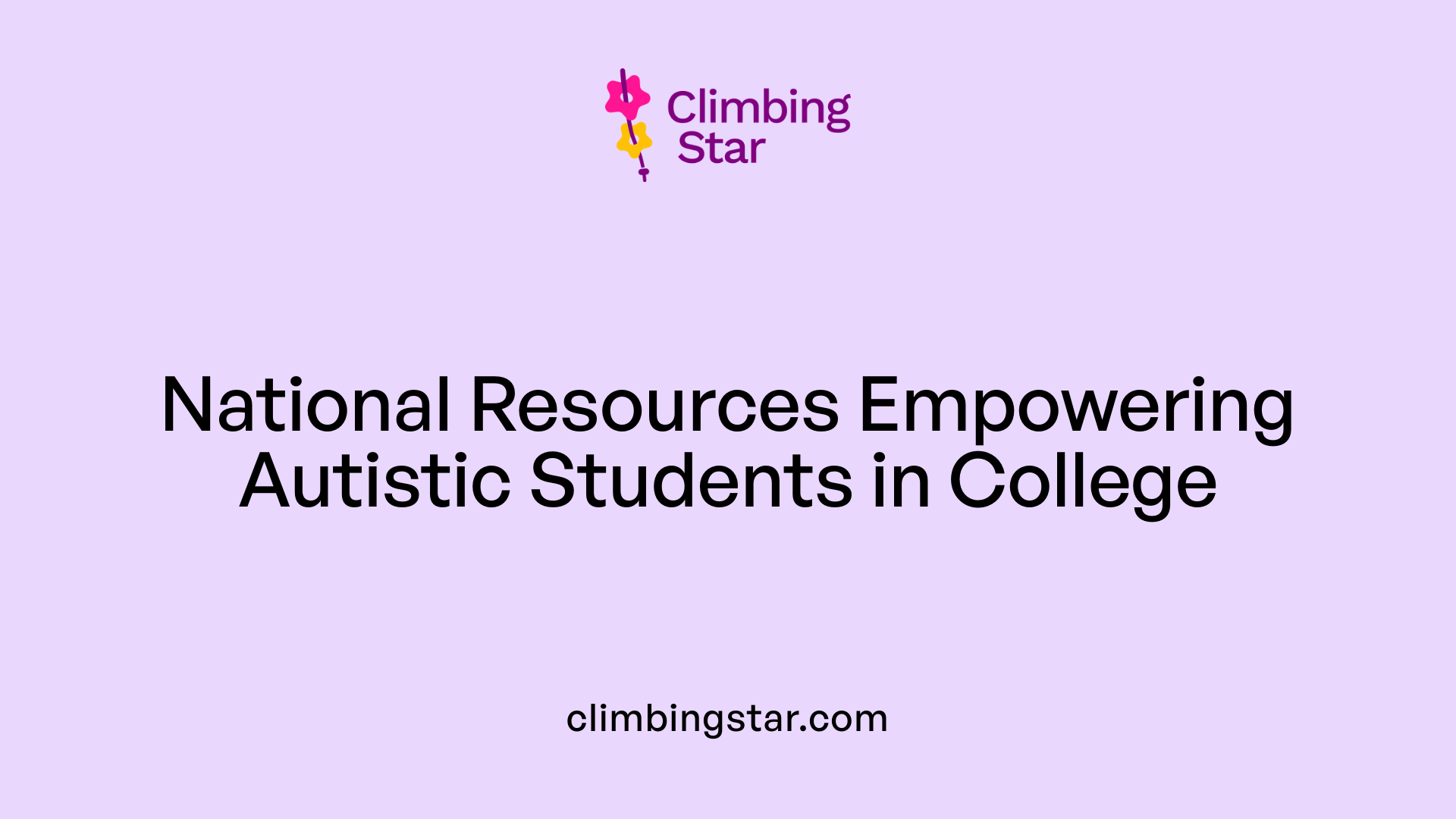
Role of the American Autism Association
The American Autism Association (AAA) plays a vital role in supporting college-bound students with autism by providing comprehensive informational kits tailored for families navigating higher education options. These kits include detailed guidance on available college programs, support services, and strategies to facilitate a smoother transition to college life.
Information Kits and Resources for Families
Families receive valuable resources that offer insights into academic, social, and independent living supports available nationwide. The AAA's informational materials help parents and students understand program features such as peer mentoring, social skills training, and transition coaching, empowering families to make informed decisions.
Advocacy and Awareness in Higher Education
Beyond resource dissemination, national organizations like the AAA advocate for greater awareness and inclusion of students with autism within higher education settings. They work to increase campus accessibility and promote the development of specialized programs that address the unique needs of neurodiverse students.
Collaboration with Universities and Support Services
These organizations collaborate closely with universities to enhance existing support frameworks. Their partnerships help expand program offerings, such as executive functioning coaching, career preparation, and mental health services, ensuring that institutions deliver holistic assistance to students.
Programs like AHEADD and College Autism Spectrum (CAS)
National initiatives such as AHEADD and College Autism Spectrum (CAS) complement university-specific programs by offering coaching, social skills development, and college application support. These programs specialize in personalized assistance, helping students improve academic success and social integration throughout their college years.
Tailored Success Stories: Highlighting Unique College Programs for Autism
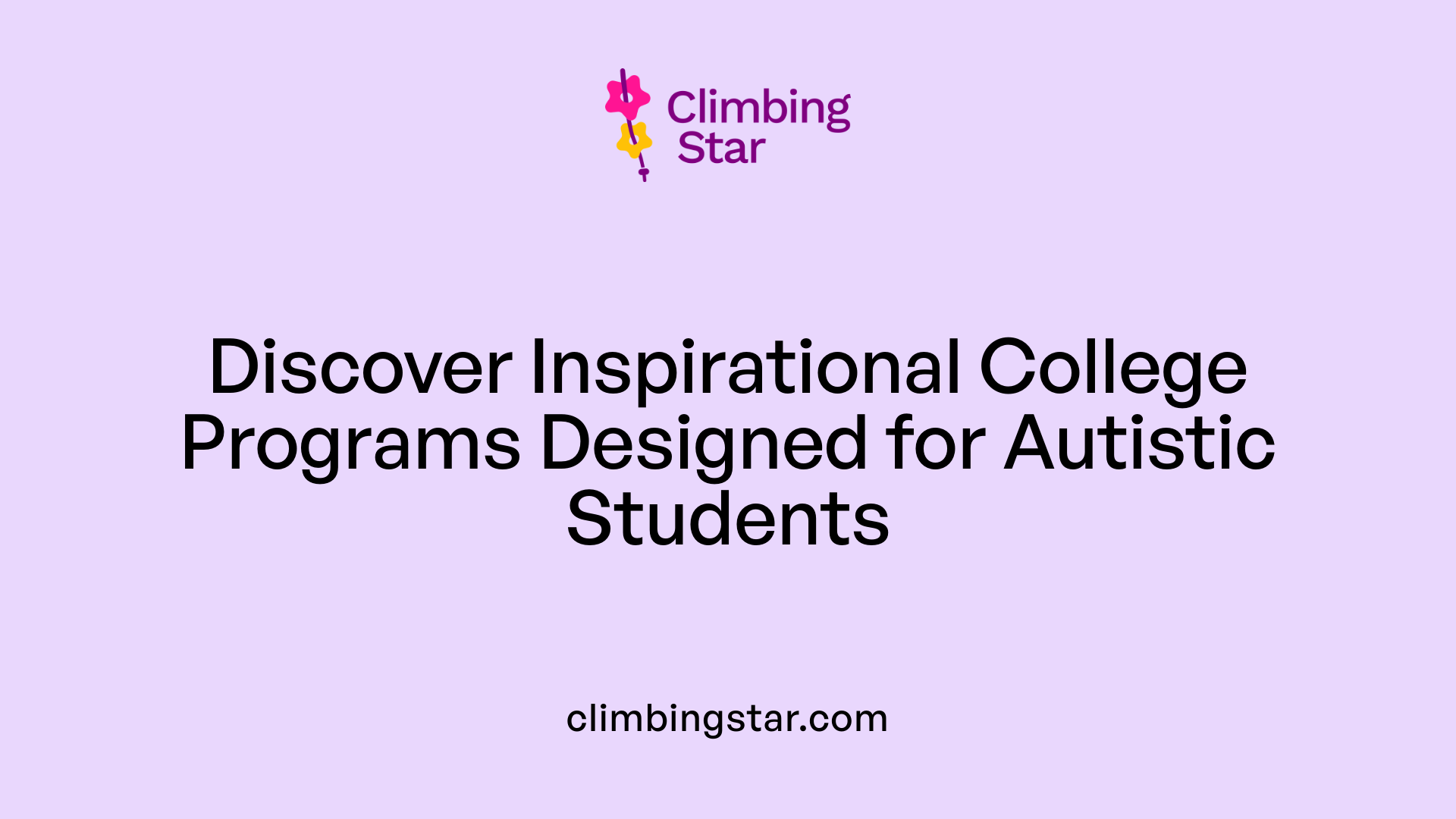
Landmark and Beacon Colleges’ Focus on Learning Differences
Landmark College stands out by addressing challenges not only for students with autism but also those with ADHD, dyslexia, and executive function issues. Offering associate and bachelor's degrees, it creates an inclusive environment designed for neurodiverse learners. Similarly, Beacon College, the first accredited U.S. college dedicated to learning differences, emphasizes academic and social success for neurodiverse students through specialized support programs.
Defiance College’s ASD Affinity Program
Defiance College tailors its support through the ASD Affinity Program, which focuses on customizing academic, residential, and social resources. This comprehensive approach helps students gain independence and thrive both academically and personally.
Rutgers ASPIRE and Drexel Autism Support Programs
Rutgers University offers the ASPIRE program that combines peer mentoring, skills courses, and case management to enhance social, academic, and vocational functioning, including options for independent living. Drexel University’s Autism Support Program provides free, confidential peer mentoring alongside seminars to foster understanding of autism spectrum disorder in the college context.
Texas Tech’s CASE and University of Maryland’s SIGNA Initiatives
Texas Tech’s CASE program engages students with learning specialists for academic support and independent living guidance. Meanwhile, the University of Maryland’s SIGNA program equips neurodivergent students with skills in executive functioning, social communication, and self-advocacy through coaching and social activities.
Holistic Approaches Combining Academic, Social, and Life Skills
Many programs feature a holistic approach, addressing multiple facets of student life. Customized coaching, peer mentorship, academic tutoring, and life skills training come together in a framework designed for success. Programs such as these support not only academic achievement but also social integration and career preparedness, ensuring students with autism have the tools to excel on campus and beyond.
Empowering Neurodiverse Students for College Success
With an expanding array of specialized programs, colleges nationwide are increasingly equipped to support students on the autism spectrum through comprehensive academic, social, behavioral, and life skills initiatives. Applied Behavior Analysis remains a cornerstone therapy underpinning many interventions, affirming its effectiveness and adaptability. As colleges continue to evolve their services, the combined efforts of institutions, qualified professionals, families, and national organizations pave the way for autistic students to achieve independence, academic success, and meaningful participation in college communities.
References
- College Programs and Students with ASD
- College Programs
- 19 Best Colleges for Neurodivergent Students
- College Programs for Students with Autism
- What to Consider When Looking for a Qualified ABA Provider
- Applied Behavior Analysis (ABA)
- The effectiveness of applied behavior analysis program ...
- The Controversy Around ABA
- 6 Benefits of ABA Therapy for Children with Autism

